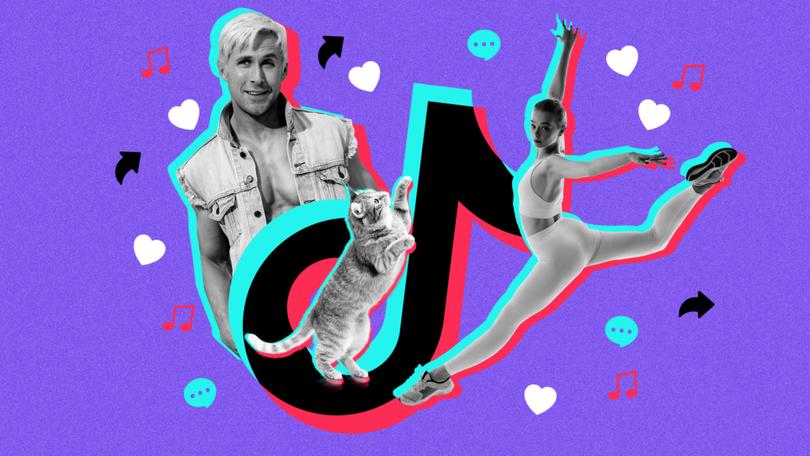JENI O’DOWD: TikTok threats can’t be ignored but we should tap into its positive influence
Accusations of TikTok being a tool for espionage and data collection linger and cannot be dismissed lightly. However it can also be a powerful tool for positive influence on a global scale.

I have a confession. I love TikTok, and not only do I have an account, but my cat has one too (with nearly 15,000 likes).
And I am certainly not of the TikTok generation. In fact, my teenagers often remind me that I’m on the “wrong side” of TikTok as my feed is dominated by health, animal, and Ryan Gosling videos, and I certainly do not follow anyone who has millions of subscribers.
So, yes, I am a middle-aged woman loving an app designed for another generation.
Sign up to The Nightly's newsletters.
Get the first look at the digital newspaper, curated daily stories and breaking headlines delivered to your inbox.
By continuing you agree to our Terms and Privacy Policy.But what I enjoy about TikTok is being able to see the creativity and views of millions of different people around the world; people who are free to express an opinion for thousands to see — the same people who may not have made it past any casting directors due to arbitrary criteria such as height, hair colour, appearance or body size.
TikTok is a platform for unrestricted self-expression, welcoming individuals from all walks of life.

I love the comedic brilliance of Melbourne performers Nick White and Tilly Oddy-Black. And then there’s the creativity of people like the UK’s Nicholas Flannery, who does short videos parodying popular television shows. Aussie Olympic diver Sam Fricker inspired a generation to love sport, and it’s intriguing to watch behind-the-scenes glimpses of the incredibly talented Australian Ballet and so much more.
And then there are the millions and millions of very normal people just like me, of all ages, who get to express their thoughts and ideas to the world.
Case in point: I stumbled across Russell Manser, an ex-bank robber and prison escapee from NSW who now fights for survivors’ reparation by helping victims access justice through the legal system. He also has nearly 40,000 followers.
Manser recently had a lot to say about domestic violence, asking what was wrong with men who felt they had to “finish someone, destroy their family, and create so much pain and havoc?”
He advocates for men to step up, confront their mates exhibiting troubling behaviour, and make a change.
Manser says: “How do you stop them? You ostracise them; you isolate them… it’s time for other men to make men accountable, that’s how we make this change.”
I love his thoughts. Targeting millions of men out there who are equally appalled by domestic violence would make a great campaign. And the idea came from an ex-bank robber no less — not a highly paid advertising creative.
However, like any platform, TikTok, owned by the Chinese tech giant ByteDance, has its darker aspects.
Accusations of it being a tool for espionage and data collection linger and cannot be dismissed lightly. And there’s no doubt there are potential risks associated with its algorithmic content recommender system (where someone may watch a video on self-harm, then similar videos emerge in their feed. (With me, it’s just cats. And Ryan Gosling.)
There’s no doubt similar issues plague many other popular social media platforms. There is a need for a broader conversation around data security, online privacy, and mental health awareness which extends beyond TikTok alone.
While I am not a huge fan of the Albanese Government, I do applaud them for recently recognising the power of TikTok and other social media platforms.
They signed up a group of well-known influencers for a social media campaign (including on other platforms such as Instagram, Snapchat, and YouTube) aimed at speaking to “the next generation of Australians about the harms of vaping and nicotine addiction”.
The influencers chosen included Australian cricketer Ellyse Perry, actor and content creator Ella Watkins, and online comedy duo Lachlan and Jaxon Fairbairn of Fairbairn Films.
What was particularly interesting was the admission by Health Minister Mark Butler that the Government did this as teenagers could not be reached by traditional advertisers.
And yes, the tabloids went mad when an old photo emerged of one of these influencers vaping. But wasn’t that the whole point? That vaping is out of control, especially among the young?
TikTok may have started as a platform for creativity, but you can’t ignore the fact it’s evolved into the primary source of news and influence for many young adults.
As Mr Butler pointed out, the platform fills a void left by conventional channels like free-to-air television, commercial radio, and newspapers, which, for years, have struggled to engage this demographic effectively.
And parts of the mainstream media seemingly endorse TikTok, using its videos as “news”. Channel 10’s The Project this week interviewed two British women who seek out cheating spouses and show their videos on the app; the Daily Mail often runs breathless stories written from TikTok such as MUM SHAMED AFTER PUTTING A BISCUIT IN KID’S LUNCH BOX! Or my favourite: TIK TOK USERS REVEAL THEY DELETED THE ADDICTIVE APP! This story quoted four — yes four — random people with no actual facts or statistics. But I bet it got a great click rate.
And yes, there are a lot of uninformed or wrong opinions on the app; but that’s the same with the internet in general.
With nearly 9 million Aussies using TikTok, it can be a powerful tool for positive influence, fostering creativity, raising awareness, and sparking conversations on a global scale.
And that’s why I love TikTok.
Jeni O’Dowd is the founder and editor of Lifestylenews.com.au
